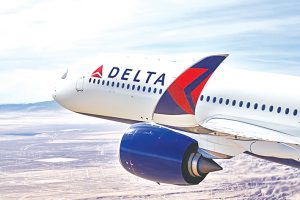BLOOMBERG
Delta Air Lines Inc and United Airlines Holdings Inc are offering to trim flights by as much as 10% at some of the country’s busiest airports this summer to ease congestion and delays — but only in return for a promise from federal regulators that they can get them back.
The Federal Aviation Administration (FAA) has reached out to airlines with multiple slots at airports in greater New York City and Washington and asked them to drop flights in exchange for flying larger aircraft, the agency said. The arrangement extends from May 15 through September 15, it said in a press release.
Delta and United said they may reduce flight service from John F Kennedy, LaGuardia and Newark Liberty International airports in the New York City vicinity as well as Washington’s Reagan National Airport, according to letters and released by the FAA.
“Absent increased flexibility, there exists a high probability congestion and delay†will plague the New York region, the FAA said in its order.
American Airlines Group Inc wrote to the FAA that it is still evaluating the FAA plan, but agreed it would “improve airspace conditions and the customer experience in the broader New York region.â€
Delta is reviewing its network and can’t comment on how its flight schedule will be affected ahead of an April 30 deadline to identify which slots and operating times it may waive, a spokesman said. United declined to comment beyond a letter to the FAA acknowledging it would take part in the plan. American didn’t immediately comment.
The unusual move is an attempt to get ahead of the kind of post-pandemic problems that plagued the airline industry in the past year, particularly at airports hit by surging flight numbers and air traffic controller shortages. Delays in New York have an out-sized impact on the entire air system because so many flights emanate and terminate in the region.
The FAA air-traffic facility that guides aircraft into and out of the three major airports around New York City has only 54% of the optimal number of fully trained controllers, the FAA said. It can take years to train a controller and the Covid-19 pandemic slowed the FAA’s ability to hire new ones.
There were more than 41,000 delays in that airspace last year from May through September attributed to controller staffing, but flight schedules are expected to grow by 7% in the area this year, the FAA said. Already this year in January and February, it said there has been a 50% increase in congestion-related delays in New York compared to last year.
 The Gulf Time Newspaper One of the finest business newspapers in the UAE brought to you by our professional writers and editors.
The Gulf Time Newspaper One of the finest business newspapers in the UAE brought to you by our professional writers and editors.
